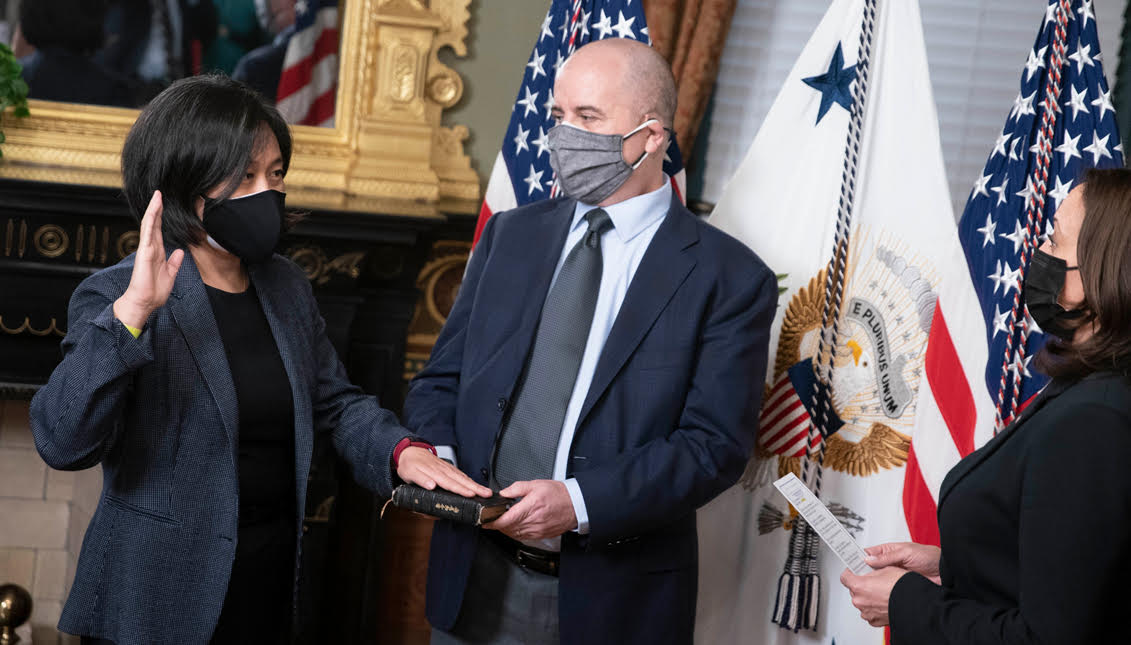
Katherine Tai confirmed as the first-ever Asian-American United States Trade Rep
Tai has her work cut out for her in rebuilding the U.S.’s relationship with China after four years of strife.
Taiwanese-American attorney, Katherine Tai has been confirmed as the first Asian-American to serve as United States Trade Representative.
The 47-year-old attorney was officially sworn in on Thursday, March 18, by Vice President Kamala Harris.
It is critical our trade policies prioritize American workers and businesses. @AmbassadorTai's extensive experience when it comes to trade will help us restore our economy and U.S. global leadership. Congratulations and Happy Birthday Ambassador! pic.twitter.com/ZHLx8OCWAU
— Vice President Kamala Harris (@VP) March 18, 2021
Tai, who is a critic of China’s trade practices, was confirmed with a Senate vote of 98-0.
Tai’s many responsibilities as the new U.S. Trade Representative, include addressing these trade practices in China, carrying out trade agreements and improving the State’s relationship with its allies, according to a report from The Guardian.
Tai, the daughter of Taiwanese immigrants, is well-versed in the field of economics and trade practices. Before her recent confirmation, she served in the Trade Representative’s Office of General Counsel, and was the chief Democratic trade counsel for the House Ways and Means Committee.
According to the Washington Post, she is currently the only Asian-American woman serving under President Biden’s administration in a Cabinet-level position.
Senate Majority Leader Chuck Schumer praised Tai’s confirmation, stating that she will be “an essential player in restoring America’s credibility with our trading partners and promoting international cooperation to tackle some of the world’s biggest problems.”
Schumer has the utmost confidence that the right person has been chosen for this important role.
Tai’s confirmation comes on the heels of the Biden White House doing everything they can to distance themselves from the Trump administration’s antagonistic tone it took when dealing with China.
On many occasions between 2007 and 2014, Tai successfully argued the U.S. case against China’s trade practices in front of the World Trade Organization.
She has been critical of certain Chinese policies and believes that the U.S. needs to confront the fellow world superpower “forcefully and strategically.”
Former top White House trade negotiator Clete Willems noted that Tai’s fluency in Mandarin, a language spoken by nearly 80% of China’s population, will “command respect” at the negotiating table.
Katherine Tai, the new U.S. trade representative, turned 47 on the day she was sworn into office. In a note to staff, the first Asian-American USTR promises to be a champion of the “small and mighty agency” as they tackle a long list of challenges. https://t.co/4h4DBnAx6X pic.twitter.com/JXAktbad5S
— POLITICO (@politico) March 22, 2021
“As former head of USTR’s China trade enforcement, Katherine has experience bringing and winning joint WTO disputes against China while partnering with countries like the EU and Japan and is likely to pursue a similar approach,” Willems wrote in an email.
Last month, as she testified before the Senate Finance Committee, Tai took an indirect shot at Trump’s often turbulent approach to negotiating with Beijing.
“I know firsthand how critically important it is that we have a strategic and coherent plan for holding China accountable to its promises and effectively competing with its model of state-directed economics,” Tai said.
RELATED CONTENT
In her opening statement, Tai said that the issues facing her will be complex, as China is both a “rival, a trade partner and an outsized player whose cooperation we’ll also need to address certain global challenges.”
"We must remember how to walk, chew gum and play chess at the same time,” she said.
Honored to serve as @USTRadeRep. I’m ready to walk, chew gum and play chess at the same time!
— Ambassador Katherine Tai (@AmbassadorTai) March 18, 2021
The new Trade Representative has pledged to collaborate with U.S. allies to present a united front to Beijing. While Trump was in office, his approach was much more chaotic and aggressive.
Rather than coordinating with U.S. allies on trade decisions, Trump imposed strict tariffs on steel and aluminum and threatened to target European cars as well.
Tai did not commit to dropping the foreign metal taxes during her confirmation hearing. She simply noted that tariffs have the potential to be a “legitimate tool in the trade tool box.”
She dodged a question about whether the Biden administration will renew the Trans-Pacific Partnership (TPP), a pact with 11 countries along the Pacific Rim. The pact deliberately excluded and isolated China while cementing connections between the U.S. and other Asian countries.
Trump referred to the TPP as a “job killer,” and withdrew from it during his first week of office in 2016.
As the daughter of immigrants, Tai said that being able to serve as the nation’s top trade representative holds “special resonance” for her.
She noted that her father was a researcher for the Walter Reed Army Institute of Research, and her mother is currently working at the National Institutes of Health.
“I’m proud to live in a country where, in just one generation, their daughter could grow up to represent the U.S. and our interests around the globe,” Tai said.
USTR Katherine Tai was sworn in on the bible that her grandmother brought with her to Taiwan after fleeing China, which was then brought to America by Katherine’s mom. that little chinese bible one day ended up in the white house and i just think that’s pretty cool
— emilie tueting (@EmilieTueting) March 24, 2021
“The chance to serve the American people, fight on their behalf, and represent them on the world stage once again will be the greatest honor of my life,” Tai said during her February remarks before the Senate Finance Committee.










LEAVE A COMMENT: